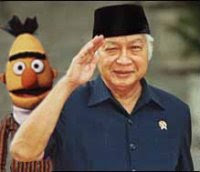
There has been a lot of hand wringing and soul-searching in the media recently regarding the 10th anniversary of Mr. Soeharto being toppled and the start of the country's transition to democracy. The general consensus seems to be that Indonesia is still very much in transit. In fact I reckon it's barely left the depot and is currently stuck in traffic around 50 yards down the road surrounded by tofu and cigarette sellers.
Indonesia's 1998 revolution did indeed have a pretty hollow ring to it and seemingly left about 90% of Suharto's New Order regime still clinging on to the reins of power. Perhaps it all ended before it even started, when the students, stunned that the old man had finally fallen on his sword, accepted the incumbent vice president, nutty Professor BJ Habibie as his replacement.
Away from the Academy, at street level, the '98 rioters were somewhat less than egalitarian in their anti-New Order fury. Most of their revolutionary fervor seemed to be directed towards looting TV sets from shopping plazas and then setting fire to the ground floor whilst their comrades were on the upper floors nicking kitchenware from the food court. Boy did they get a surprise.
Another fun activity enjoyed by these visionary revolutionaries was breaking into ethnic Chinese homes and businesses and raping the womenfolk whilst chanting,"Allah Akbar." The ghost of the late Che Guevara, had it been drifting through the city on those dark days, may have had a few bones of contention to pick with this rather compromised struggle of the urban proletariat. "Seize control of the means of production... and then burn them down? Erm... Hang on a minute lads."
Looking back from a decade on at this historical flashpoint it seems pretty clear that the transition towards democracy has been painfully slow, if not actually completely static with regards to stuff like corruption and the legal system.
Indonesia's two big news stories of the past few weeks seem to suggest that much of the impetus for change has evaporated into the ether and that a fairer country is still a hell of a long way off.
The first story is that of the Ahmadiya Islamic sect and the government's moves to ban the group rather than to nail its colors firmly to the mast of modern secularism as it should do. I find it depressing that as soon as Indonesian society won its freedom from the political oppression of a tyrannical dictator, it immediately seeked to re-emasculate itself under the yoke of religious oppression and dogma.
Today, it is the Ahmadiya that suffer but I suspect that many of the country's Christians, Buddhists and Hindus are starting to sweat it a bit. "There is only one Islam," chant the Ahmadiya terrorizing extremists incorrectly. Indonesians are Sunni Muslims. I suggest these fundamentalists book flights to Iran or Iraq and see what reception their message receives from the Shia majorities over there.
The confusing constitution and the need to revise it are at the heart of the issue here. The constitution supposedly guarantees, "Freedom of religion." However, the nation's totemic Pancasila ideology only allows six official religions and also obliges citizens to believe in one God.
There are contradictions here. The Hindus of Bali have many gods whilst Buddhists and Confucians have no God at all. And of course it goes without saying that atheism is completely off the map. Where did they get this number one from? Presumably from the dominant monotheism.
The other great issue of the last month or so has been the government's decision to cut fuel subsidies and raise prices which has focused attention again on the desperate inequalities and poverty of Indonesian society. Acquaintances of mine have argued that it's the rich with their gas guzzling cars that have been the main beneficiaries of the fuel subsidies. In purely financial terms this is undoubtedly true, as is the fact that we should all cut down on our consumption before the planet boils alive. If fuel is kept at an artificially cheap price, people have no incentive to use it more sparingly.
However, things look different to the country's poor majority. A rise in fuel prices will no doubt lead to a rise in inflation. If you are on the breadline and lead a hand to mouth existence then a small rise of Rp 500 on your bus fare or your bag of beras (rice) is going to push you further towards the abyss.
There is no great tradition of helping the little man in this country but a nation a decade into democratic reforms should be able to organize something a little better than driving vans full of cash handouts into vacant football fields and letting the rabble descend pell-mell.
There's never a dull moment here though I'll concede that. Here's to another decade of fun.

